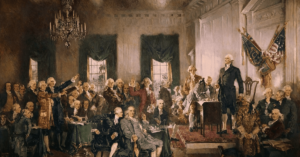When Will I Be Blown Up? Balancing Security and Civil Liberties in the Cold War
In accepting the Nobel Prize for literature in 1950, William Faulkner said: “problems of the human spirit” were on hold. Now, Faulkner said: “There is only the question: When will I be blown up?” Faulkner admonished the young writer that “He must teach himself the basest of all things is to be afraid; and, teaching himself that, forget it forever.” Faulkner, speaking only five years after World War II ended, was referring to the growing tension between the United States and the United Soviet Socialist Republics (USSR). Faulkner believed that fear was the basest emotion, but Americans in 1950 can be forgiven for thinking their fears were not baseless.
Consider these events of the preceding year, 1949. Mao Zedong’s Chinese Communist army gained control of mainland China, and Mao established the People’s Republic of China. Asia’s largest nation was under communist rule. In April of 1949, twelve Western European nations joined the North Atlantic Treaty Organization (NATO), establishing a military alliance meant to guard against Russian communist aggression in Europe. Then, on September 23, President Harry Truman released a statement announcing that “We have evidence that within recent weeks, an atomic explosion occurred in the USSR.” Consequently, the United States no longer held an international monopoly on atomic weapons.
Many Americans assumed war with the Soviet Union – possibly nuclear war – was inevitable. American policymakers and the American people generally believed that communism was monolithic, directed from Moscow, and bent on worldwide domination. For many Americans those assumptions meant that a war between capitalist nations and communist nations was inescapable. Therefore, the fear of being blown up was realistic. Congressman Henry (Scoop) Jackson of Washington captured many Americans’ reaction to the news that Russia had “the bomb.” “Until now, our atomic superiority has held the Kremlin in check,” Jackson argued. “Falling behind in the atomic armaments competition will mean national suicide. The latest Russian explosion means that Stalin has gone all out in atomic energy. It is high time we go all out.”
For many Americans, going “all out” included aggressively uncovering Soviet espionage in the United States. Events in 1950 inflated Americans’ anxiety that communist spies had infiltrated the federal government. In January, Alger Hiss, a former State Department official, was indicted for perjury connected to his spying for the Soviet Union. That same month, atomic physicist Karl Fuchs confessed to spying for the Soviets. The German-born Fuchs was a British citizen who began working on the Manhattan Project, the US-driven effort to develop an atomic bomb, in 1944. He admitted to sharing scientific secrets that may have shown USSR scientists some shortcuts on the road to developing an atomic weapon. Then, in February, Joseph McCarthy, the junior senator from Wisconsin, speaking in West Virginia, claimed he possessed a list of 205 State Department employees who were members of the Communist Party of the United States. McCarthy went further, claiming Secretary of State Dean Acheson was protecting the communists working in his department.
In the wake of McCarthy’s speech, many Americans wanted no stone unturned in the effort to uncover communist subversion. Critics contended this effort would lead to a witch hunt against citizens holding unpopular opinions. Americans might be socially ostracized, or worse, criminally prosecuted for their beliefs. In fact, this is what happened. McCarthyism spawned congressional investigations that uncovered little to no espionage, succeeding only in damaging the reputations, careers, and social standing of those under investigation.
The tension between safeguarding homeland security and protecting civil liberties has deep roots in American history. The Alien and Sedition Acts of 1798 were enacted, in part, out of fear of European intervention in the new republic. President Abraham Lincoln’s suspension of habeas corpus during the Civil War paints him with the brush of tyranny in some historians’ minds. Franklin Roosevelt’s decision to intern Japanese Americans, some of whom were American citizens, during World War II seems a bridge too far. Indeed, a 1983 government report found that “not a single documented act of espionage, sabotage or fifth column activity was committed by an American citizen of Japanese ancestry or by a resident Japanese alien on the West Coast.” Yet in 1944, the Supreme Court sanctioned this assault on civil liberties in the case of Korematsu v. United States.
Like today’s threat from domestic and international terrorism, the Cold War generated controversy over how far the federal government could restrict civil liberties in the name of protecting Americans from violence. Americans generally agree that the government can punish behavior, but not opinions. Most Americans would agree that US citizens who spied for the Soviets, revealing government secrets, were guilty of treason. What about membership in the communist party? Did membership by itself constitute a threat, if not accompanied by overt actions that betrayed the US? In other words, what restrictions on the first amendment freedoms of expression and assembly are permitted in the name of internal security?
At Teaching American History, we believe students best understand history when they are encouraged to dive into the primary sources, closely reading the words written by the authors of the time and putting their questions to those authors themselves. In this way, students reach their own conclusions about the choices made by Americans of the past. We encourage you to engage your students in a close reading of these documents as they discuss the need to balance security with the protection of civil liberties.
Documents in this chapter include:
- Senator Joseph McCarthy (R-WI), Address to the League of Women Voters, Wheeling, West Virginia, February 9, 1950
- The Internal Security Act, September 22, 1950
- President Harry S. Truman, Veto of the Internal Security Act, September 22, 1950
We have also provided audio recordings of the chapter’s Introduction, Documents, and Study Questions. These recordings support literacy development for struggling readers and the comprehension of challenging text for all students.
Teaching American History’s We the Teachers blog will feature chapters from our two-volume Documents and Debates with their accompanying audio recordings each month until recordings of all 29 chapters are complete. In today’s post, we feature Volume II, Chapter 25: Internal Securities and Civil Liberties. On May 11, we will highlight Chapter 12: The Peculiar Institution: Positive Good or Pernicious Sin from Volume I of Documents and Debates in American History. We invite you to follow this blog closely, so you will be able to take advantage of this new feature as the recordings become available.



